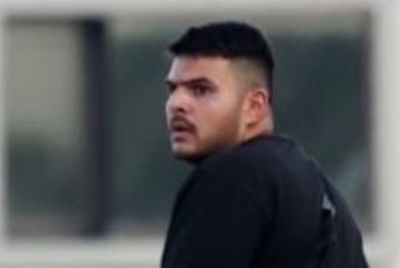Eleven More Gaza Hostages Released As Israel-Hamas Truce Extended
Israel said Monday that 11 more hostages released in the Gaza Strip had arrived safely, hours after the announcement that a truce between Israel and Hamas in Gaza will be extended by two days, opening the way for further releases.

Israel said Monday that 11 more hostages released in the Gaza Strip had arrived safely, hours after the announcement that a truce between Israel and Hamas in Gaza will be extended by two days, opening the way for further releases.
Hamas announced the agreement to prolong the truce by 48 hours shortly before it was due to end Tuesday, though there was no immediate confirmation from Israel.
The move was nevertheless hailed by UN Secretary-General Antonio Guterres as "a glimpse of hope and humanity in the middle of the darkness of war".
Late Monday, Israel's military announced that 11 hostages were "now in Israeli territory".
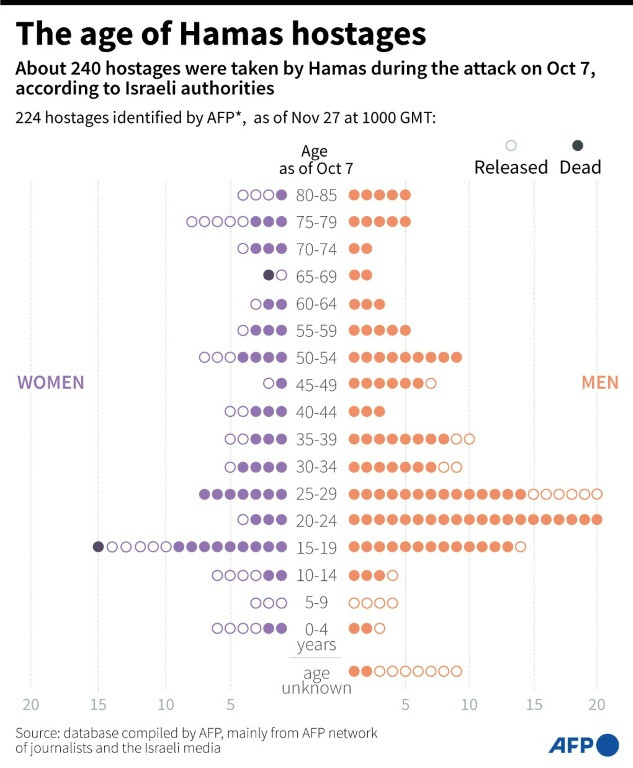
"Our forces will accompany them until they are reunited with their families," it said in a statement, adding that the military "salutes and embraces the released hostages upon their return home".
Shortly after the arrival of the hostages was confirmed, Israel's prison authority said 33 Palestinian inmates had been released.
The freed Israelis are dual nationals of France, Germany and Argentina, according to Qatar, which helped mediate the deal.
German Foreign Minister Annalena Baerbock welcomed the release of the hostages, including "two German teenagers" after "52 days of suffering and despair".
US Secretary of State Antony Blinken will pay his third wartime visit to the Middle East this week, a US official said Monday, just as mediators announced an extension of a truce in Gaza.
A senior US official, speaking as Blinken arrived in Brussels for NATO meetings, said the top US diplomat would meet with Israeli Prime Minister Benjamin Netanyahu in Tel Aviv and with Palestinian president Mahmud Abbas in Ramallah.
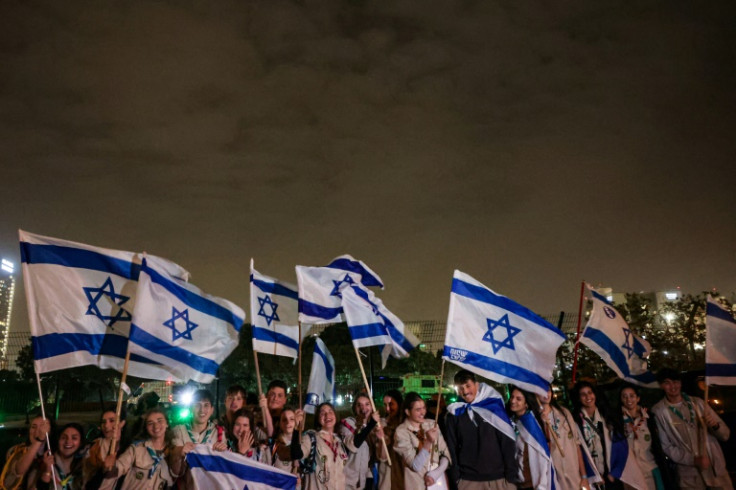
"In his meetings in the Middle East, the secretary will stress the need to sustain the increased flow of humanitarian assistance to Gaza, secure the release of all hostages and improve protection to civilians in Gaza," the official said.
"The secretary will discuss with partners in the region the principles he laid out for the future of Gaza and the need to establish an independent Palestinian state," the official said.
Qatar -- with the support of the United States and Egypt -- has been engaged in intense negotiations to establish and prolong the truce in Gaza.
Qatari foreign ministry spokesman Majed Al Ansari announced that "an agreement has been reached to extend the humanitarian truce for an additional two days in the Gaza Strip."
Hamas, which runs Gaza and triggered the war when its militants made an unprecedented attack on southern Israel last month, said it was drawing up a new list of hostages for release.
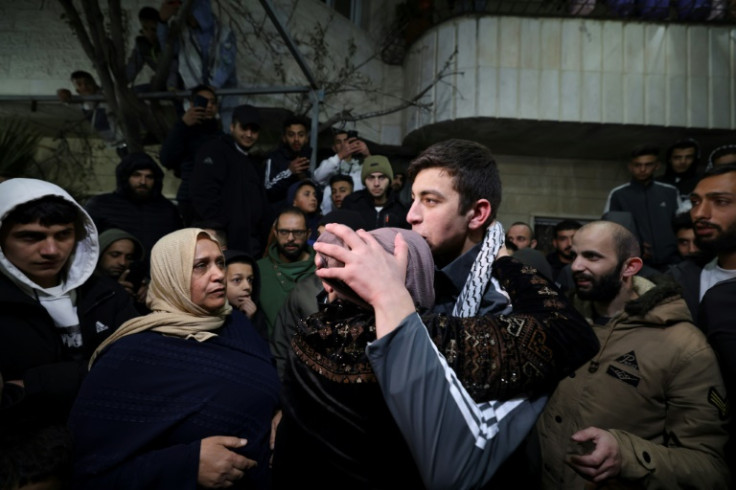
Israel has been clear that the pause is designed to allow Hamas to free more of the roughly 240 hostages it has been holding since the October 7 attack, which also killed 1,200 Israelis and foreigners, according to officials in the country.
But there had been widespread calls to use the break in hostilities to allow more humanitarian aid to reach civilians in Gaza, where Israel's campaign against Hamas has killed almost 15,000 people, mostly Palestinian civilians, according to Gaza's Hamas government.
Most Gaza residents have been displaced and the whole territory is short on essentials such as food, water and medical supplies.
The extension announcements came after US President Joe Biden, top EU envoy Josep Borrell and NATO Secretary General Jens Stoltenberg added to calls for a longer break in fighting.
Over the initial four days, a total of 50 hostages and 150 Palestinian prisoners were to be exchanged.
The tearful reunions of families and hostages have brought relief from images of civilian death and suffering in the seven-week war.
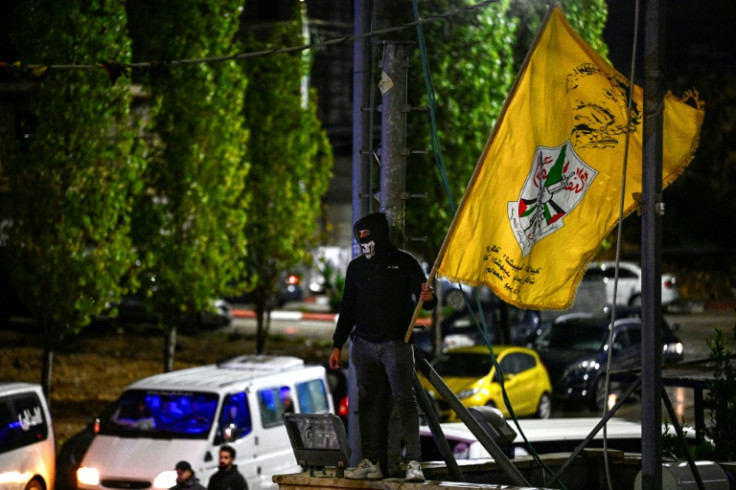
"That's our goal, to keep this pause going beyond tomorrow so that we can continue to see more hostages come out and surge more humanitarian relief into those in need," Biden said Sunday.
The White House welcomed the agreement to extend the truce.
"We would of course hope to see the pause extended further, and that will depend upon Hamas continuing to release hostages," US National Security Council spokesman John Kirby told reporters.
Kirby said that "in order to extend the pause, Hamas has committed to releasing another 20 women and children".
The EU's Borrell had called for the pause to be prolonged "to make it sustainable and long lasting while working for a political solution."
"Nothing can justify the indiscriminate brutality Hamas unleashed against civilians," he said. "But one horror cannot justify another horror."
The third group of hostages released Sunday included four-year-old American Abigail whose parents were both killed in the October 7 attack, the worst since the country's founding in 1948.
Inside Gaza, the Hamas-run health ministry said that despite the four-day pause, no fuel had been taken to generators in hospitals in the north of the Gaza Strip.
In Gaza City, the truce made the scale of the destruction clear. People walked or bicycled along debris-lined streets, where the cars were flattened and buildings torn apart.
Gaza City Mayor Yahya al-Siraj said that without fuel, the territory could not pump clean water or clear waste accumulating in the streets, warning of a potential public health "catastrophe".
At Al-Shifa hospital, which had been a focal point of the war, young Gazans were working to clean up the facility, and "we hope it can soon resume its activities," said Gaza health ministry spokesman Mahmud Hammad.
A French warship arrived in the Egyptian town of El-Arish, near the border with Gaza, to serve as a hospital for wounded civilians, a port source said.
While coming under pressure to extend the pause, Irael's leaders have dismissed any suggestions of a lasting halt to the offensive.
"We continue until the end -- until victory," Netanyahu said in Gaza on Sunday, the first visit to the strip by an Israeli premier since 2005.
His office has proposed a war budget of 30 billion shekels ($8 billion) for 90 days.
In another sign of mounting international concern, UN rights experts called Monday for independent investigations into alleged war crimes and crimes against humanity carried out in Israel and the Palestinian territories since October 7.
© Copyright AFP 2025. All rights reserved.











